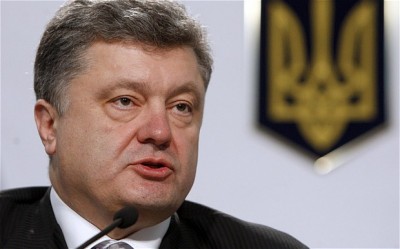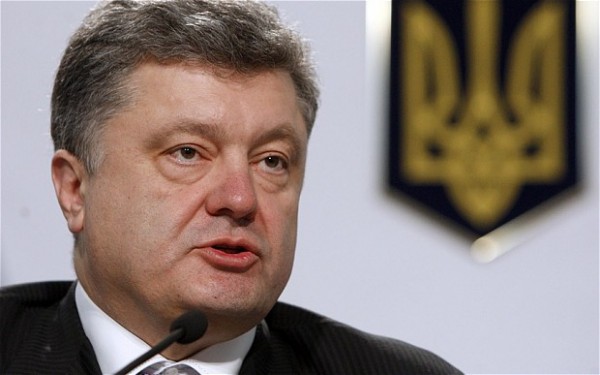 Petro Poroshenko appeared poised to win Ukraine’s presidential elections Sunday without having to enter a second-round runoff, after three exit polls showed the chocolate tycoon had won more than half the vote.
Petro Poroshenko appeared poised to win Ukraine’s presidential elections Sunday without having to enter a second-round runoff, after three exit polls showed the chocolate tycoon had won more than half the vote.
The wealthy former foreign minister won more than 55% of the vote, according to the three exit polls released Sunday night. According to the polls, he received 55.7% to 57.3% of the vote.
According to Ukrainian election rules, a candidate can win the presidential election outright by receiving more than half the vote in the first round. If the top candidate receives less than half the vote, he or she must enter a runoff against the second-place finisher.
Former Prime Minister Yulia Tymoshenko finished second, according to the exit polls, which said she won 12.4% to 12.9% of the vote.
Election officials said more than 40% of Ukraine’s registered voters had cast their ballots by 3 p.m. local time, with five hours left before polls were due to close. Still, fewer than a quarter of the usual polling stations had opened in the eastern Donetsk and Luhansk regions, controlled by pro-Russia separatists who denounced the vote.
The election comes three months after pro-Europe protesters on Kiev’s central square toppled Kremlin-backed President Viktor Yanukovych, who fled to Russia. Since then, a pro-Russia backlash against the new Kiev authorities in the south and east has fractured the former Soviet republic and ushered in its worst crisis since the fall of the U.S.S.R. in 1991.
Rebels who declared independent republics in the Donetsk and Luhansk regions, together home to 6.57 million people, prided themselves Sunday on disrupting the vote. Polling stations had opened Sunday morning in only nine of the 34 counties in those regions, according to Ukraine’s Central Election Commission. Crimea, the Black Sea peninsula annexed by Russia, was also left out.
Ukraine’s new president will inherit a fractured nation ensnared in both political and economic crises.
The rebel insurgency in the east has left dozens of people dead, divided Ukrainians and transformed much of the country’s southeast into a conflict zone. Officials in Kiev hope a plan to give individual regions more power over their own affairs can appease alienated constituents in the east and hold the country together.
On the economic front, Ukraine faces a long road of tough reforms to meet the requirements of a $17 billion rescue package the International Monetary Fund approved April 30. Those reforms call for a steep increase in taxes and domestic gas prices, coupled with austerity measures to reduce spending. Even with such moves, the IMF predicts a 5% contraction in Ukraine’s economy in 2014 and says more bailout money could be required.
Many across the country of 45.4 million people, including Crimea, hoped the election would deliver a popular mandate to a new president capable of ending the turmoil.
“There’s great hope that this will be the beginning of stability in the country,” said Galina Zamotayeva, a 54-year-old endocrinologist casting her ballot at a school in Kiev. Voters crowded into a hot room in the school and waited in long lines to receive ballots.
Violence in the east flared in the days before the vote. There were no immediate reports of clashes between government troops and separatists on Sunday, but Italy’s foreign ministry said an Italian photographer had been killed Saturday in the area of Slovyansk, the heart of the rebel insurgency. A ministry official gave few details but said it was a “violent death.”
The Kremlin has denounced the new interim government in Kiev as illegitimate and declared Mr. Yanukovych the rightful president of Ukraine. But Russian President Vladimir Putin said Friday that the Kremlin planned to “respect the choice of the Ukrainian people” in Sunday’s election and work with the winner.
Ukrainian officials need a sizable turnout to show the election represents a large swath of the nation.
“The participation in the elections will be high,” Ukraine’s Central Election Commission Chairman Mykhailo Okhendovsky said Sunday. He said the result would be considered legitimate regardless of the participation rates in Donetsk and Luhansk. Ukraine had a 67% turnout nationally in the first round of voting in its most recent presidential elections in 2010.
A small number of voters from Crimea made an extra effort to cast their ballot on Sunday. They included a group of Crimean Tatars, who largely opposed the Russian annexation and who traveled to the mainland.
Valentina Muschinskaya, a 65-year-old director of a Russian-language school in Crimea, took the overnight train to the Ukrainian capital with her sister to cast her ballot.
“We are Ukrainian patriots,” she said. She said she planned to vote for Mr. Hrytsenko, the former defense minister, because she didn’t want to vote for a rich tycoon.
In the central Ukrainian province of Dnipropetrovsk, officials reported heavy turnout early in the day. Security in the region has largely been secured by the tycoon governor, Igor Kolomoisky, who has been bankrolling police and army units with his personal wealth.
R. Spencer Oliver, Secretary General of the Parliamentary Assembly of the Organization for Security and Cooperation in Europe, toured the region, and said there appeared to be no threats to security. He said he had also received reports from OSCE officials in Odessa and Kharkiv, which said everything was “going smoothly.”
He conceded that turnout in Luhansk and Donetsk would be far lighter. “I think that it is unfortunate that some parts of the country won’t be casting votes, but it’s a very small percentage,” he said.
Russia didn’t send election monitors and Russian Foreign Minister Sergei Lavrov said Friday the Kremlin would rely on the OSCE’s assessment. The U.S. and a number of European countries did send observers.
U.S. Sen. Kelly Ayotte (R., N.H.) arrived in Kiev as part of a monitoring mission led by the International Republican Institute, a Washington-based democracy-building nonprofit.
She said she met Mr. Poroshenko and Ms. Tymoshenko, both of whom requested military aid from the U.S. so Ukraine can shore up its beleaguered army. Ms. Ayotte is helping advance a bill in the Senate that would supply Ukraine with body armor, antitank missiles and antiaircraft weapons.
Ms. Ayotte said she hopes to win support from Democrats. “They are not asking us for boots on the ground,” Ms. Ayotte said. “They are asking us for some basic support.”
WSJ


Leave a Reply
You must be logged in to post a comment.